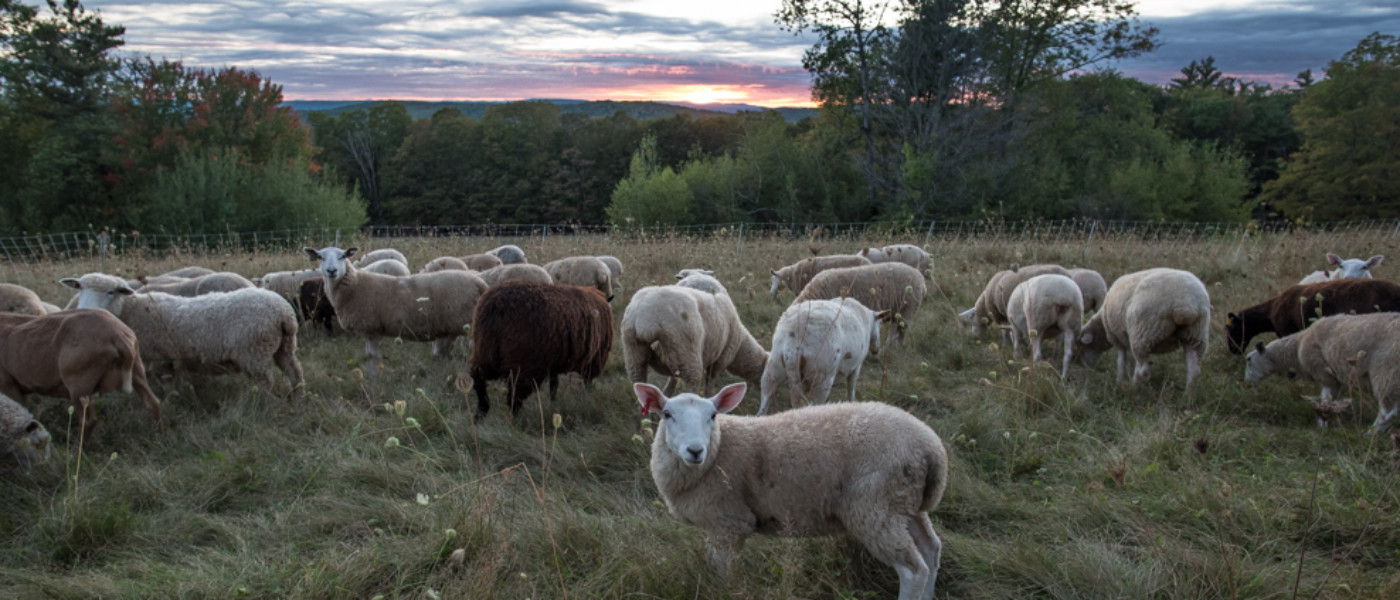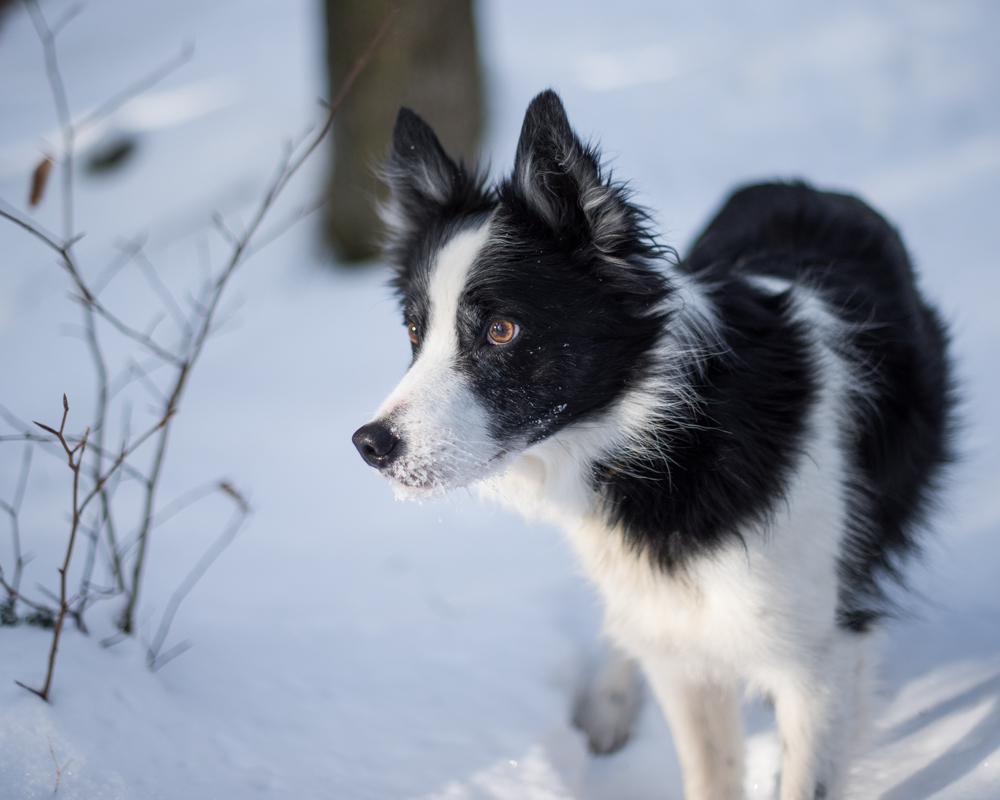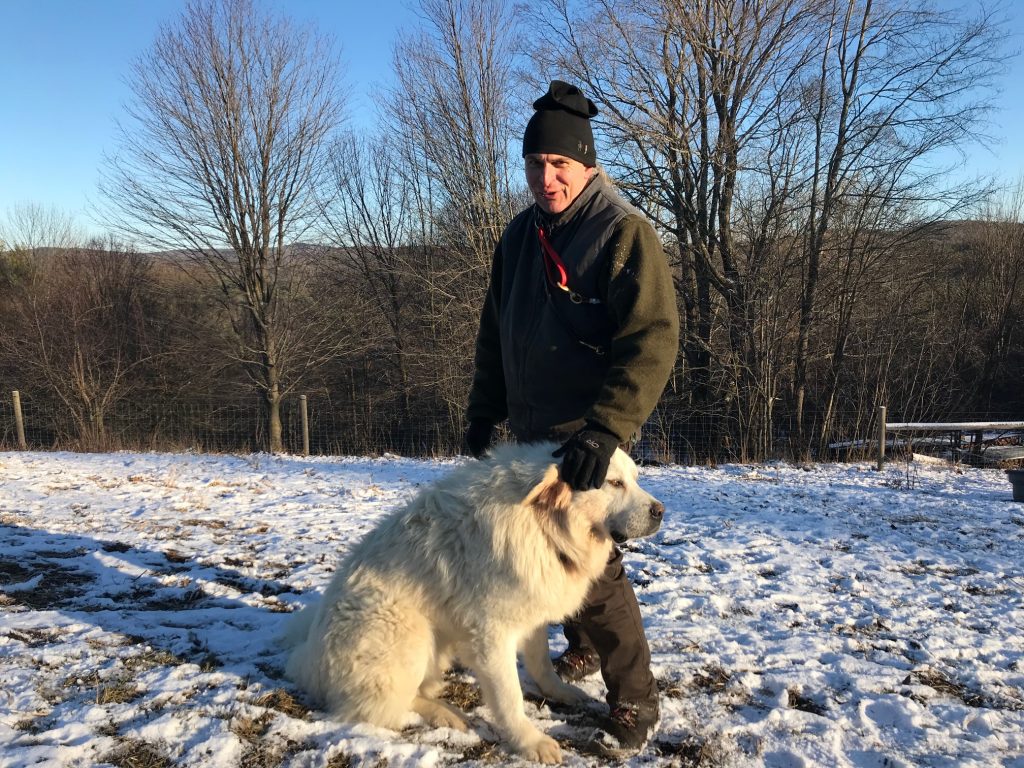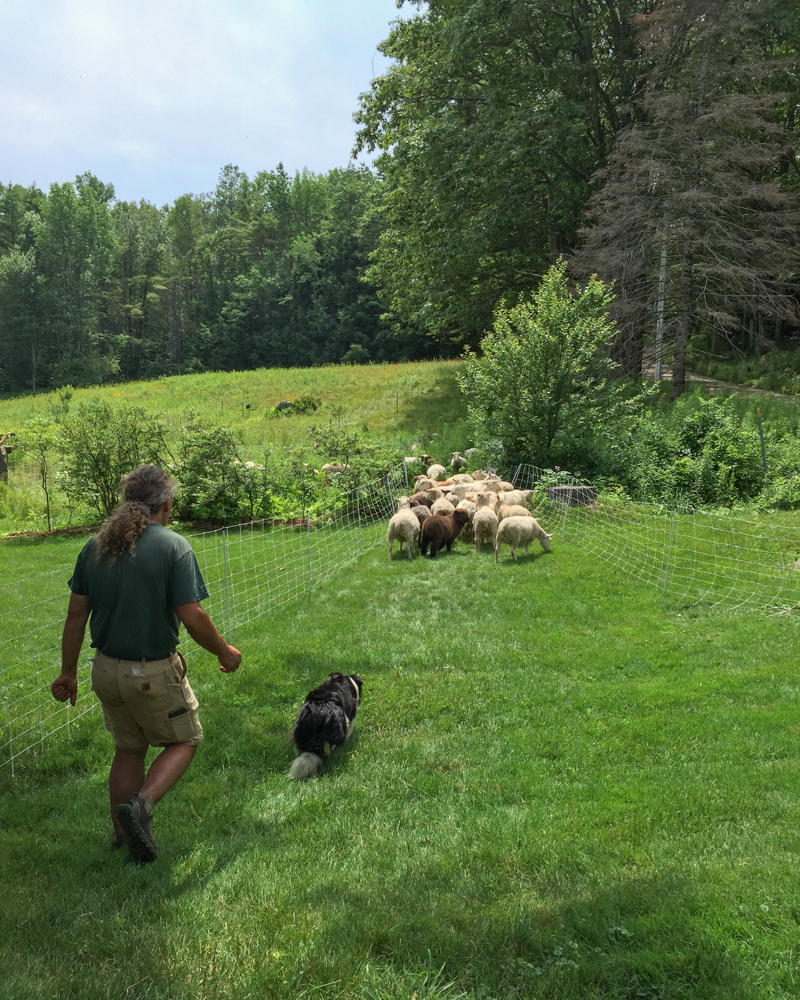Everyone knows dogs are man’s best friend. But could they also be our best career counselors? It worked for Milton Trimitsis, farmer and shepherd at Five Sigma Farm in Sullivan, New Hampshire. “It was the border collies that brought me to farming. Totally.”
As an urban resident of Boston with a love of the outdoors, and as a devoted dog owner, Milton trained his border collies, Luc and Cass, to herd. He owned six sheep in a shared flock in Belmont, MA, with a friend and got the livestock bug there. A master carpenter with a thriving business in Boston, he began to think about how he could incorporate farming into his life to escape the city and live more closely with nature.
Farming had always interested Milton but, “I knew I didn’t have the soul of a vegetable farmer. I have so much respect for those who do it, but it was so clear that I couldn’t. I like that there are people who don’t want to work with animals. I am not one of those.” With this realization and desire, Milton began looking for farmland that would suit his needs and hopes.
Early in his search, Milton found an ideal farm and began the process of transition with the family who owned it. But after nearly a year of negotiation, it was clear that while some members of the family were ready to sell, other members were not. Milton had invested time and emotional energy into this future farm, creating a business plan specifically for the property. All for naught. It was another eight years or so before his search came to a successful end.
From Five Sigma Farm, Milton can look across the southern New Hampshire hills to the farm that might have been his. But, he says, “If the first farm hadn’t fallen through, I might not have been ready. The intervening years were not lost. I came into farming with more of a clue.”
Five Sigma Farm is about 1,300’ above sea level, surrounded by farmland and forest. Its ground is rocky (they don’t call New Hampshire “The Granite State” for nothing) and Milton has been working to improve it from day one. The National Resource Conservation Service (NRCS) has been an invaluable partner as Milton converts this land into a regenerative, pasture-based livestock farm. He has received NRCS funding to improve the pasture, with cost-share funds granted for seeding, de-compacting the soil, soil supplements, fencing and roadwork.
Healing the Soil
Currently, Milton raises pastured sheep—a fair challenge with snow on the ground until the end of April or beginning of May. The grazing season is typically May 15 through November 15. He practices management-intensive grazing, a grazing system that allows animals to graze only a small portion of the pasture (an individual paddock) while other paddocks are rested and allowed to recover. By rotating the pasture frequently, farmers can make more efficient use of their land than if they continually keep animals in one large pasture.
Management-intensive grazing is part of a regenerative farm system that has a number of benefits including better, more efficient rationing of forage and feed by livestock; healthier pasture because plants can recover and become more resilient between grazing; increased pasture yield; decreased use and cost of machinery and fuel; and more even distribution of manure, which creates healthier soil, increased soil fertility and reduces runoff and potential water contamination. Lastly, grazing livestock helps to maintain and improve the best carbon sink we have: grasslands. Worldwide, grasslands are estimated to contain 343 billion tons of carbon[1], nearly 50% more than is stored in forests. Properly managed grazing is essential to, as Neil Young puts it, “take carbon out of the sky and put it in the soil;” in other words, to help mitigate climate change.
In grazing season, Milton moves his sheep to new pasture daily and even twice a day in the summer. Because he doesn’t yet own enough land to support his flock, Milton supplements his acreage with a patchwork of local pastures he leases or shares with various landowners. Altogether his flock grazes about 100 acres. With his regenerative methods, he’s increasing the quality of their soil while keeping the fields mowed and holding back the constantly encroaching forest.
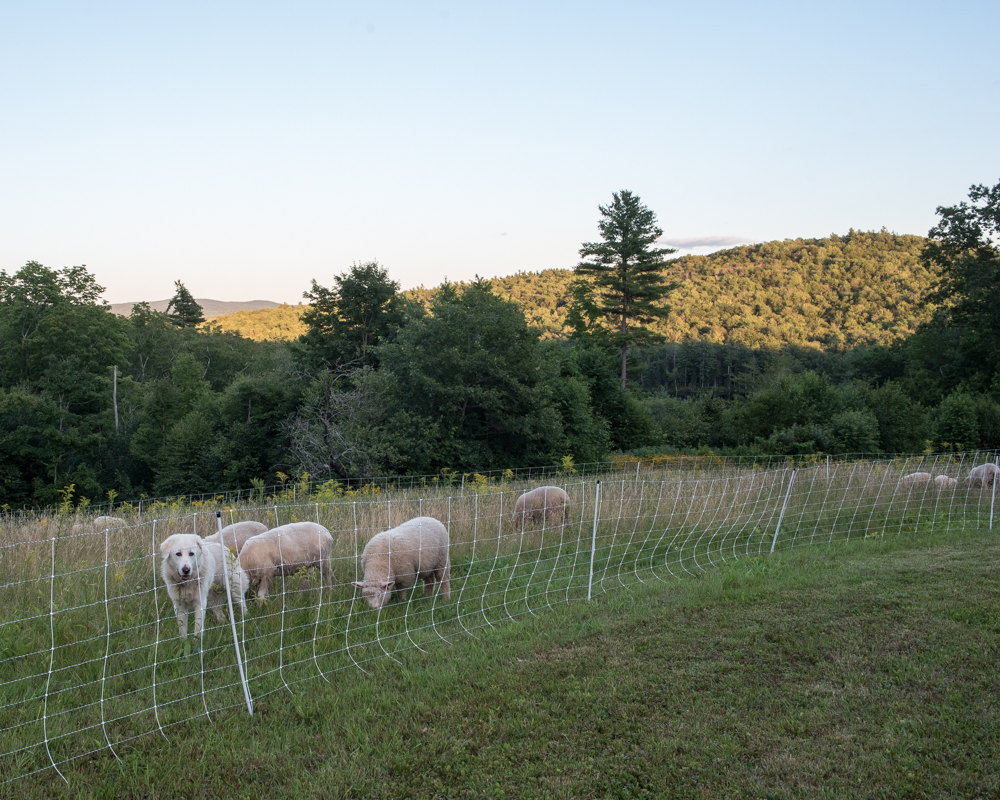
The sheep are rotationally grazed via a moveable system of fencing moved daily or even twice daily. Photo by Milton Trimitsis.
Becoming Part of the Community
Milton received a hearty welcome when he moved to the farm in October 2016. “I didn’t get the city slicker label,” he says, referring to the assumption that a new neighbor moving to the country from the city may not get the warmest reception. “I think it was obvious to people that I was in so deep. That I truly believed in doing this.” He explains, “I knew I was coming in not knowing a lot. I’d call people and say, ‘I’m new to this and I need some advice.’ People have mostly been extremely welcoming of that.” To illustrate, Milton shares an example of learning how to use a gun. “I had a sick ewe that needed to be euthanized, and I realized I need to be able to take care of this on my own. A man here in town, Mark Smith, came over and lent me a gun, showed me how to use it, and then how to gut and skin the carcass so that nothing went to waste.” Another local, Bob Jones, has been instrumental in helping Milton learn how to drive a tractor and become proficient with all his farm equipment.
Milton counts himself lucky in having a mentor, Bill Fosher, a local farmer, conservation planner and agronomist who has shared his incredibly deep knowledge of sheep and grazing. “A year and a half in, I asked Bill, ‘So how many people do what I’m doing and what you do?’ and he said, ‘It’s vanishingly uncommon. Nobody does this. You’re at the lunatic fringe of intensive management.’” Milton wears that as a badge of honor, it’s clear.
In addition to the mentoring and help of farmers, neighbors and friends, a farm-hand works a couple days a week on projects that Milton isn’t getting to as quickly as he’d like due to the day-to-day work of keeping a sheep farm running and his construction business, which he still operates in Boston. “Brooke works on the stuff that keeps things improving here on the farm. He’s an amazing guy.”
“Today I felt particularly aware of how screwed I’d be without the community of people who are helping me figure out how to do this farming thing.” –Milton Trimitsis, in a post from his blog
Since moving to the farm four years ago, Milton has become a member of the town planning board and the school board. He’s vice president of the Granite State Graziers, an organization committed to spreading the practice of pasture raised livestock. They hold an annual graziers gathering in winter, and pasture walks during grazing season. Last spring, Milton’s farm hosted a walk on how to manage spring flush – the first month of pasture growth, the proper management of which is integral for the success of the entire grazing season.
Milton says the organization is about meeting people where they are and showing people there are options for doing things a little differently. “We want to welcome people – we don’t want to be militant graziers; we want to bring people in. It’s hard to farm… to develop a system that works for you; people are understandably reluctant to change anything. So we ask ourselves, What are things that can help people take one step?” One way they help with that first step is through their fence lending library. “The library allows people to borrow electric fencing materials. For people who are interested in starting or doing more rotational grazing, this is a way to try it out.”
Rather than moving in and competing with local, long-established sheep farmers, Milton chose to rely on his Boston connections for his market. He sells whole lamb and individual cuts, and he delivers directly to his clients—individuals and restaurants.
Looking to the Future
As his fourth lambing season approaches, Milton looks forward to having a flock of close to 250 sheep. He lambs later than some other farms so that the lambs can be born on pasture. Milton explains, “If the ewes are confined too much you get a lot of mis-mothering. Some that have not lambed yet might take a newborn lamb and then orphan their own lambs when they are born.”
Before lambing this season, Milton and Bob will work on constructing a mobile chicken coop for the next step in Milton’s business plan: raising pastured laying hens. He explains, “The trouble with selling lambs is your best customers are buying twice a year. Eggs are a good way to offer another pastured product to them, and more often. Additionally, a whole lamb is $350 – $450; whereas eggs are $5-6, so the eggs are a good threshold for reaching new customers.”
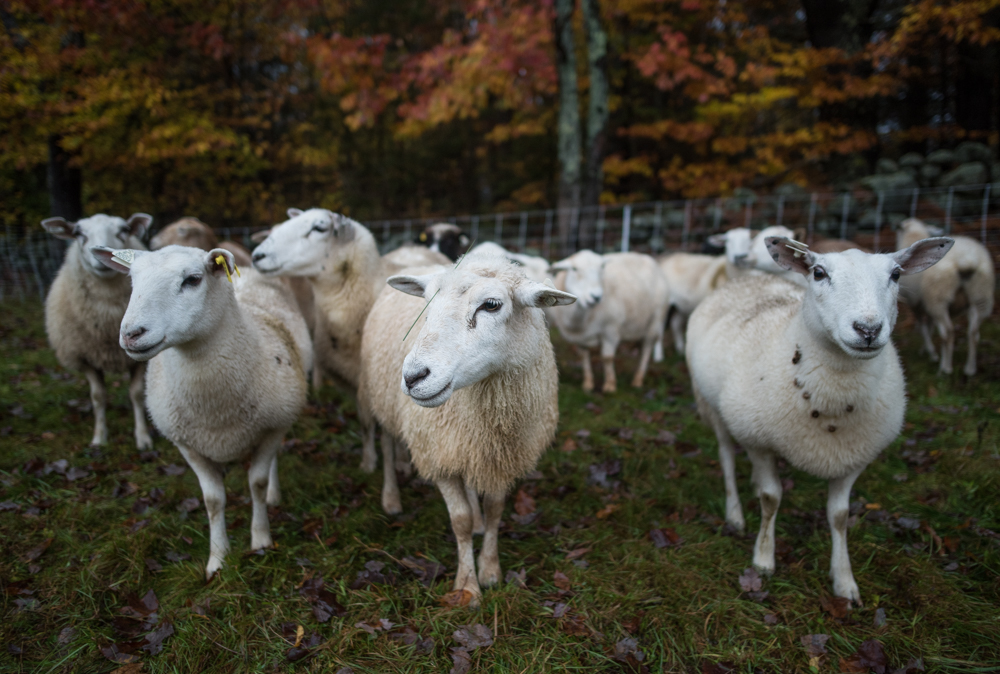
“Sheep are individuals with strong opinions; ignore this at your peril.” –Photo and caption, from his blog, by Milton Trimitsis.
Milton says sheep are much, much smarter than people give them credit for. “They recognize people, they remember people, they know dogs. They are unbelievable merciless about testing dogs and whether they’ve got nerve. They tested Chloe and they know they can walk all over her. She can only work young lambs.”
In total, there are four Border Collies (Luc, Chloe, Cass and Becq) that help herd the sheep—some to a greater extent than others—and five Livestock Guardian Dogs (LGDs—Bravo, Peter, Fanny, Athena and Zorba) that keep them safe from predators. The Border Collies love to loll by the fire between working sessions of moving the sheep. They really get a challenge in the summer when moving the herd to some pastures requires long walks up the hills of New Hampshire. The LGDs include Maremma Sheep Dogs, Spanish Mastiffs and Great Pyrenees, and they spend all of their time outside, living as members of the flock. Though some of them are goofy dogs who practically demand a belly rub from visitors to the pasture, they all take their work seriously. Bravo fought a bear last year to protect his flock!
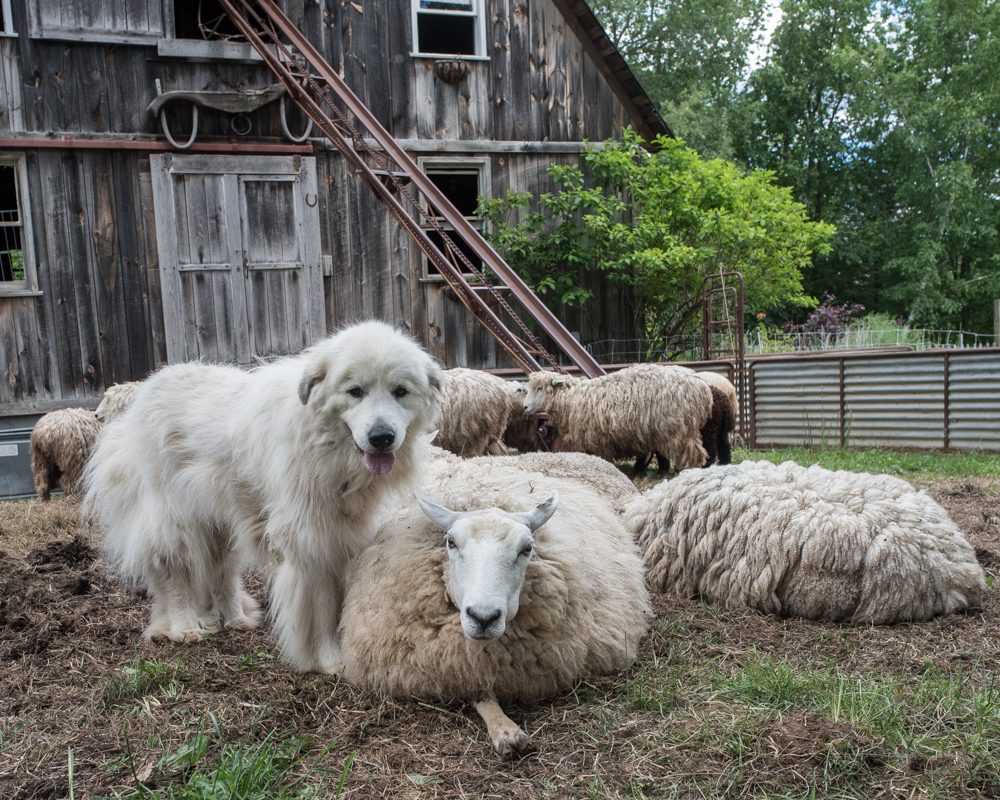
One of the Livestock Guardian Dogs stays with the sheep awaiting shearing. Photo by Milton Trimitsis.
Milton says one of the surprising things about farming is the collaborative relationship he has with his veterinarian, as compared to when he just had “pets.” He explains, “I text my vet and ask for a farm visit and he says, ‘You can do this… go get your scalpel.’” This approach, and Milton’s resulting ever-growing knowledge, comes in handy. He explains, “Sheep have an infinite list of things that affect them. You have to pay attention and learn the signs that things aren’t right early. The first couple of years I had terrible problems with pregnant ewes having prolapsed vaginas. Now that’s on the list of things I can fix myself!”
Milton is on a long track to farm profitability that will keep him busy on the farm and with carpentry clients in Boston, but he likes the balance of both kinds of work. And each time he leaves Boston behind to come home to the farm is a reminder of the right decision his dogs helped him make. Upcoming challenges he sees in agriculture include the recent discovery of PFAS (a family of 4,700 man-made, industrial chemicals, that don’t degrade easily and are known commonly as “forever chemicals”) in soil on farms and throughout our water supply, as well as the debate about meat production and climate change. He’ll keep working to inform people that there are other models for livestock production that are not confinement and industrial—in other words, models like the one he’s using, raising livestock on pasture where they can actually help us mitigate climate change by putting carbon into the soil through improved grazing.
[1] Food and Agriculture Organization of the United Nations, Livestock solutions for climate change, 2017. www.fao.org
